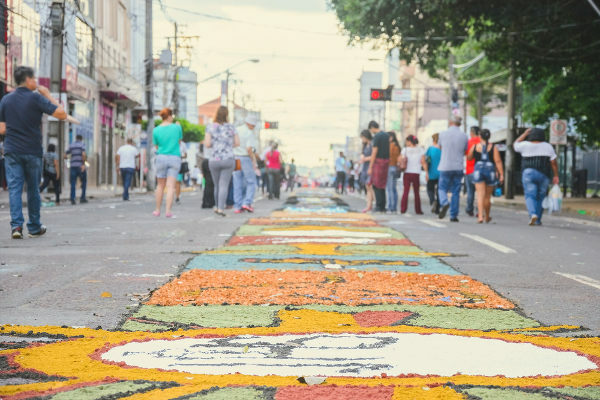Corpus Christi is a commemoration that is part of the calendar of the Catholic Church, and its creation dates back to the 13th century. Here in Brazil, the date is celebrated as a holiday, always in a Thursday. On the day of Corpus Christi, one of the most important principles of Catholicism is celebrated: the sacrament of the eucharist.
What is celebrated in Corpus Christi?
Corpus Christi is an expression originating from the Latin and, in Portuguese translation, it means “body of Christ”. Thus, the name chosen for this commemoration already suggests its meaning: a tribute to the Eucharist. This sacrament of Catholicism is performed as a way of remembering the death and resurrection of Jesus Christ. In this sacrament, the bread that is consumed represents the body of Christ, and the wine eaten symbolizes the blood of Christ.
The performance of the Eucharist is a reference to Last Supper, performed by Christ with his disciples during Holy Week, and at Christ's order (according to the symbology cited) to consume the bread and wine in memory of him. Even within Catholic theology, it is believed that in the Eucharist something known as transubstantiation, in which the elements (wafer and wine), after being consecrated, are transformed, in essence, into the flesh and blood of Christ.
The Corpus Christi celebration takes place exactly 60 days after the Easter. The date is compulsorily celebrated on a Thursday. This is symbolic of the fact that the Last Supper took place on a Thursday, according to tradition. Another important milestone for establishing the date is the Holy Trinity Sunday. On the Thursday following Holy Trinity Sunday, Corpus Christi is celebrated.
See too:Christian Easter and jewish Passover

Rugs are a tradition held during Corpus Christi day in many parts of Brazil.
The Corpus Christi commemoration is part of the calendar of both the Catholic Church and some Anglican churches. The date is not commemorated by Orthodox Christians or Protestants. In Brazil, due to the great Catholic tradition, the commemoration of the date is accompanied by some practices that were consolidated here from the influence of the Portuguese.
A typical Corpus Christi tradition in Brazil brought by the Portuguese is the activity of producing rugs. Corpus Christi rugs are a common practice in many parts of the country, representing important symbols and scenes of the Catholic faith. The rugs are made from various products, such as sawdust, coffee grounds, sand, etc.
Do not stop now... There's more after the advertising ;)
What is the historical origin of Corpus Christi?
The origin of the commemoration of this date dates back to the 13th century, officially in 1264, during the pontificate of Pope Urban IV (Pope of the Church from 1261 to 1264). The creation of a commemoration in honor of the sacrament of the Eucharist was the result of the influence of the reports of Juliana de Mont Cornillon, a Belgian nun who was born near the town of Liège in 1193.
Reports about Juliana de Mont Cornillon indicate that she claimed to have, for years, visions and dreams that brought a divine message about the importance of creating a feast that properly commemorates the sacrament of Eucharist. These reports initially influenced Roberto de Thourotte, bishop of the diocese of Liège, who authorized the holding of a commemoration for 1247.
The Bishop of Thourotte never actually witnessed the commemoration being held, as he died before that. However, Juliana's reports impacted another person in Liege: the archdeacon Jacques Pantaleon. This archdeacon was born in Troyes, France, and in 1261 he would be enthroned pope under the name of Urban IV, who, as mentioned, was responsible for officializing the creation of this celebration.
In addition to Juliana de Mont Cornillon's reports, another event narrated sensitized the pope to creating Corpus Christi. Reports claim that in 1264 a Bohemian priest named Peter of Prague went to Rome to meet Urban IV. During his return to Bohemia, Peter of Prague stopped at Bolsena and there performed the sacrament of the Eucharist. During the sacrament, it is said that blood began to flow from the consecrated host.
This supposed miracle became known as Miracle of Bolsena, and his report quickly spread, reaching the pope himself, who, shortly thereafter, made official the creation of Corpus Christi. Gradually, the festival spread to other parts of Europe. Corpus Christi had its importance ratified during the 14th century, and common practices to the festival were created over time.
By Daniel Neves
Graduated in History



